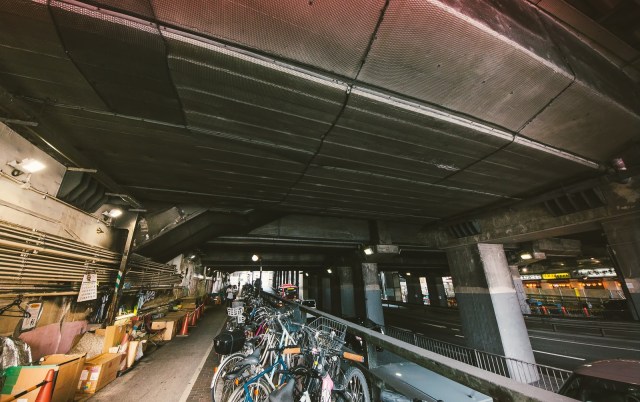
Luckily the city has a plan for them…but is it enough?
Now that Prime Minister Abe has declared a state of emergency in Tokyo and its surrounding prefectures, non-essential businesses that had previously remained steadfastly open, like pachinko parlors and Starbucks cafes, are now closing, in an effort to keep people at home and out of crowded places.
That category also includes Internet cafes, which are great, cheap places to spend the night if you’ve missed the last train, or need a budget hotel. They offer private rooms with free Internet, often including a free soft drink bar and sometimes even food. On the flip side, that also makes them popular places to stay for those who are homeless or jobless and can’t afford to rent an apartment in the city. In fact, one in four customers at net cafes in Tokyo are homeless.
▼ One popular chain, “Jiyuu Kuukan”, also offers lunch options for just 100 yen.
Unfortunately, closing Internet cafes around the city means that thousands of homeless people will be without a place to sleep for the duration of the pandemic. Initially the announcement of such closures outraged netizens and activists, who wondered if the city had any plan in place for them.
Luckily, the city is, in fact, providing housing for the homeless for the time being. The initial plans were to rent out 400 private apartments and government housing units for them, but until such places can be secured, they have borrowed the services of local business hotels for the homeless to live in during the pandemic. As with the hotel rooms for recovering coronavirus patients, this housing will be paid for by the city for the duration of the program.
One homeless man in his forties who has been living in Internet cafes for the last three years was able to take advantage of the program. After losing his day labor job because of the outbreak, he had little to no money in his possession, and began to worry about where he could go while the cafes are closed. He visited the help desk for the housing assistance program on April 8, and after being briefed on the program, was fortunately able to check into a business hotel in Shinjuku on April 10.
▼ Many homeless stay dry by sleeping under train lines and highway overpasses.
But other homeless may not be so lucky. As with many public assistance programs, there is a caveat; the homeless must prove they have lived in Tokyo for more than six months before they can qualify for the assistance. For many who live on the streets, that poses a challenge, as without an actual address, it’s hard to procure any form of proof that you have been in Tokyo for any amount of time. Many homeless do not even have IDs, so it would be unreasonable to expect them to have bank account statements, bills, or other documents that could prove their residency.
The aforementioned man was lucky to have records of donating blood within the last year, otherwise he might have been turned away. “I think it will be difficult for many others to prove their residency,” he said to NHK News. After the city is able to secure apartments, he will be moving again to a new location, but in the meantime, he feels relieved to be staying in a business hotel, and will be searching for work while receiving the support of the city.
Homelessness is often a problem swept under the rug in Japan, but at least in this case the homeless were thought of when the business closure policies were put in place. We can only hope that the barriers aren’t too high for the many who can’t afford a roof over their heads in these especially difficult times.
Source: NHK News via Hachima Kiko
Top image ©SoraNews24
Insert images: ©SoraNews24, Pakutaso
● Want to hear about SoraNews24’s latest articles as soon as they’re published? Follow us on Facebook and Twitter!



 Survey finds roughly one in four all-night Internet cafe customers in Tokyo is homeless
Survey finds roughly one in four all-night Internet cafe customers in Tokyo is homeless Iconic Kyoto Tower bathhouse closes due to coronavirus
Iconic Kyoto Tower bathhouse closes due to coronavirus Japanese Internet cafe chain evolves into Internet hotel great for backpackers, budget travelers
Japanese Internet cafe chain evolves into Internet hotel great for backpackers, budget travelers Man who knowingly spread coronavirus to various bars in Aichi dies in hospital
Man who knowingly spread coronavirus to various bars in Aichi dies in hospital 12 hours of unlimited beer and hard liquor on offer at amazing Tokyo Internet cafe
12 hours of unlimited beer and hard liquor on offer at amazing Tokyo Internet cafe Survey finds that one in five high schoolers don’t know who music legend Masaharu Fukuyama is
Survey finds that one in five high schoolers don’t know who music legend Masaharu Fukuyama is Highest Starbucks in Japan set to open this spring in the Tokyo sky
Highest Starbucks in Japan set to open this spring in the Tokyo sky Saitama is home to the best strawberries in Japan that you’ve probably never even heard of
Saitama is home to the best strawberries in Japan that you’ve probably never even heard of Osaka establishes first designated smoking area in Dotonbori canal district to fight “overtourism”
Osaka establishes first designated smoking area in Dotonbori canal district to fight “overtourism” Development of Puyo Puyo puzzle game for use in nursing homes underway
Development of Puyo Puyo puzzle game for use in nursing homes underway Women at World Wushu Championships attack each other at the speed of light
Women at World Wushu Championships attack each other at the speed of light Samurai chick pudding cake is Japan’s newest hard-to-buy, delicious-to-eat treat【Taste test】
Samurai chick pudding cake is Japan’s newest hard-to-buy, delicious-to-eat treat【Taste test】 Japanese tough guy fashion starter pack: Testing the Birth Japan lucky bag【Photos】
Japanese tough guy fashion starter pack: Testing the Birth Japan lucky bag【Photos】 Horse meat sushi restaurant opens up in Tokyo, becomes sushi’s latest craze 【Photos】
Horse meat sushi restaurant opens up in Tokyo, becomes sushi’s latest craze 【Photos】 Foreign tourists in Japan will get free Shinkansen tickets to promote regional tourism
Foreign tourists in Japan will get free Shinkansen tickets to promote regional tourism The 10 most annoying things foreign tourists do on Japanese trains, according to locals
The 10 most annoying things foreign tourists do on Japanese trains, according to locals Starbucks Japan releases new sakura goods and drinkware for cherry blossom season 2026
Starbucks Japan releases new sakura goods and drinkware for cherry blossom season 2026 Naruto and Converse team up for new line of shinobi sneakers[Photos]
Naruto and Converse team up for new line of shinobi sneakers[Photos] Is Sapporio’s Snow Festival awesome enough to be worth visiting even if you hate the snow? [Pics]
Is Sapporio’s Snow Festival awesome enough to be worth visiting even if you hate the snow? [Pics] Japan has trams that say “sorry” while they ride around town…but why?
Japan has trams that say “sorry” while they ride around town…but why? Tokyo Skytree turns pink for the cherry blossom season
Tokyo Skytree turns pink for the cherry blossom season Sakura Totoro is here to get spring started early with adorable pouches and plushies
Sakura Totoro is here to get spring started early with adorable pouches and plushies Poop is in full bloom at the Unko Museums for cherry blossom season
Poop is in full bloom at the Unko Museums for cherry blossom season Shibuya Station’s Hachiko Gate and Yamanote Line stairway locations change next month
Shibuya Station’s Hachiko Gate and Yamanote Line stairway locations change next month Japan’s new “Cunte” contact lenses aren’t pronounced like you’re probably thinking they are
Japan’s new “Cunte” contact lenses aren’t pronounced like you’re probably thinking they are Japan’s newest Shinkansen has no seats…or passengers [Video]
Japan’s newest Shinkansen has no seats…or passengers [Video] Foreigners accounting for over 80 percent of off-course skiers needing rescue in Japan’s Hokkaido
Foreigners accounting for over 80 percent of off-course skiers needing rescue in Japan’s Hokkaido Super-salty pizza sends six kids to the hospital in Japan, linguistics blamed
Super-salty pizza sends six kids to the hospital in Japan, linguistics blamed Starbucks Japan unveils new sakura Frappuccino for cherry blossom season 2026
Starbucks Japan unveils new sakura Frappuccino for cherry blossom season 2026 Take a trip to Japan’s Dododo Land, the most irritating place on Earth
Take a trip to Japan’s Dododo Land, the most irritating place on Earth Is China’s don’t-go-to-Japan warning affecting the lines at a popular Tokyo gyukatsu restaurant?
Is China’s don’t-go-to-Japan warning affecting the lines at a popular Tokyo gyukatsu restaurant? Survey asks foreign tourists what bothered them in Japan, more than half gave same answer
Survey asks foreign tourists what bothered them in Japan, more than half gave same answer Japan’s human washing machines will go on sale to general public, demos to be held in Tokyo
Japan’s human washing machines will go on sale to general public, demos to be held in Tokyo Starbucks Japan releases new drinkware and goods for Valentine’s Day
Starbucks Japan releases new drinkware and goods for Valentine’s Day We deeply regret going into this tunnel on our walk in the mountains of Japan
We deeply regret going into this tunnel on our walk in the mountains of Japan Studio Ghibli releases Kodama forest spirits from Princess Mononoke to light up your home
Studio Ghibli releases Kodama forest spirits from Princess Mononoke to light up your home Major Japanese hotel chain says reservations via overseas booking sites may not be valid
Major Japanese hotel chain says reservations via overseas booking sites may not be valid Put sesame oil in your coffee? Japanese maker says it’s the best way to start your day【Taste test】
Put sesame oil in your coffee? Japanese maker says it’s the best way to start your day【Taste test】 No more using real katana for tourism activities, Japan’s National Police Agency says
No more using real katana for tourism activities, Japan’s National Police Agency says Japanese Twitter in an uproar about Tokyo ward that banned homeless from evacuation shelters
Japanese Twitter in an uproar about Tokyo ward that banned homeless from evacuation shelters Popular tourist spots in Kyoto look like a ghost town due to coronavirus
Popular tourist spots in Kyoto look like a ghost town due to coronavirus Used tissues and odors: The five most disgusting types of customer at a Japanese Internet cafe
Used tissues and odors: The five most disgusting types of customer at a Japanese Internet cafe Several McDonald’s branches closing across Japan due to COVID-19 infections
Several McDonald’s branches closing across Japan due to COVID-19 infections Neco Republic: A cat cafe for rescue cats and the people who love them 【Pics & Video】
Neco Republic: A cat cafe for rescue cats and the people who love them 【Pics & Video】